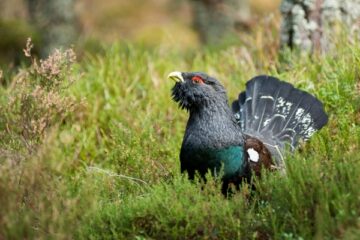 BASC is advising members that Defra has published an interactive postcode map showing areas within England thought to be at a higher risk of avian influenza.
BASC is advising members that Defra has published an interactive postcode map showing areas within England thought to be at a higher risk of avian influenza.
The online map follows Defra’s announcement that the government expects to update the temporary measures set in place to reduce the risk of bird ‘flu when they expire on February 28. A final decision on the full extent of these new measures will be made at the end of this month, but they are expected to include a more targeted approach.
Defra has said that while the risk of H5N8 bird flu remains high across the country, areas close to substantial inland or coastal bodies of water, where significant numbers of wild birds collect, are at an even higher risk.
In these areas of England, the risk is considered to be too great to move to the alternative biosecurity package and compulsory housing or total netting will continue to be mandatory after 28 February. Officials have indicated that, if confirmed, the proposals are likely to remain in place at least until the end of April.
Defra has published guidance to indicate where these areas are likely to be in England, based on current risk levels. To find out whether you are within an area of higher risk simply enter your postcode into Defra’s interactive map.
Glynn Evans, BASC’s head of game and deer management, said: “The map is a useful tool to see if you are likely to be in an area at a higher risk England. The measures proposed are based current levels of disease risk and scientific advice. They may change, so please keep checking the BASC website and social media for updates. We continue to advise our members to plan ahead, so this map can be used as part of that process.”
The Scottish Government has said that an avian influenza Prevention Zone for all poultry and captive birds (including gamebirds) will remain in force until the end of April. After 28 February, the requirements of the zone will be amended, and the option will then exist of letting birds go outside, provided enhanced biosecurity to minimise the risk of infection from wild birds is in place. The measures will apply across all of Scotland, with no targeting of specific areas.
Welsh officials have now announced that their avian influenza prevention zone , covering the whole of the country, is being extended until 30 April.
BASC continues to ask members to be vigilant and to report any dead wild waterfowl (swans, geese or ducks) or gulls or five or more dead wild birds of other species, when encountered in the same location in unusual circumstances, to the Defra helpline on 03459 33 55 77. Details of how to spot the symptoms of bird flu can be found here.
BASC reminds members and others in the shooting community that government came together with countryside and shooting organisations on 13 January and issued important information about bird flu to all those specifically involved with gamebirds. For the background to the announcement and for the link leading to the advice, please click here.
Official guidance and advice on all relevant aspects of avian influenza – from implementing biosecurity measures to spotting symptoms and how to go about reporting suspected cases – are available in a directory on the Defra website. It can be viewed by clicking here.



